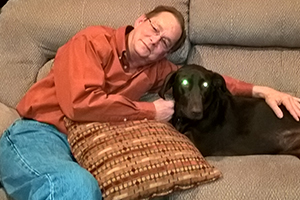
Ed and his dog, Molly.
By Ed Fox, U.S. Army Veteran and Lung Cancer Survivor
Lung cancer has been on my radar for some time now because both my father and sister died from this disease. I did everything I possibly could to prevent it: regular screenings, tests and doctor’s visits. Not even a year before I was diagnosed, I had my gallbladder removed which is where they eventually found the cancer. “Why didn’t they see the tumor during surgery?”
In February 2014, without any symptoms, I was diagnosed with stage 4 lung cancer. Next thing I knew, I was being told that I had six months to live and there was not a whole lot they could do. Now you see, I am a very stubborn person. I was not about to let cancer take me. No way! I felt too good and I had a lot to live for. At the time I was in the process of buying a house and asking my girlfriend (now wife) to marry me.
I went through a grueling regimen of weekly chemo and daily radiation for four months. Radiation to my back caused vertebrae to fuse to my throat which took away my voice. The cancer spread to my bones, specifically my left hip, and it felt like someone was shooting bullets through it. The doctors said there was a chance I might lose my leg.
I realized, through this process how critical it is to be your own advocate. No one is truly looking out for you, except for you. I started doing my own research on treatment options. At the time, Opdivo, an immunotherapy treatment, was on the verge of FDA approval. As soon as it was approved, my doctor put me on it. Just a few months later, I went for a PET scan and there was no sign of cancer! Since then, I have been on Opdivo for maintenance. They say once you have stage 4 lung cancer, you always have cancer. I am proving them wrong.
Here’s my advice for someone diagnosed with lung cancer: First, set aside anything in your life that creates stress. It is not worth it. After diagnosis, I proposed to my now wife, moved into my new house and kept living my life. Second, ask for help if you need it. All your effort has to go to fighting cancer and there’s no room for anything else. There are wonderful people and programs out there, like the ones offered by Lung Cancer Alliance, to help you wherever you need it (emotionally, financially, logistically e.g. transportation, etc.). And finally, keep a positive mind. Everyone has a chance! I’m living proof of it!
Has lung cancer changed my life? Heck yeah. Radiation to my hip caused me to lose nerves in my leg so I can no longer feel my foot. I am 63 years old and use a walker to balance. I can’t get around like I used to, but I have my life and cherish it every day. Now, when I go for my infusions, I share my story with those in the waiting area who look like they need some hope. If my experience can help just one person, then it’s worth it.
If you or a loved one have questions about lung cancer or need someone to talk to, please contact us at support@go2.org or call 1-800-298-2436.

Thank you for sharing your inspiring story. You have been through so much. I admire your focus on living as well as you can instead of focusing on the difficult path you are on. I’m trying to do the same for the past 2.5 years and am encouraged hearing your story. The higher risk of lung cancer for our servicemen and women is unfortunately unknown and overlooked by almost all Americans and certainly not reflected in research funding. Thank you for your service.